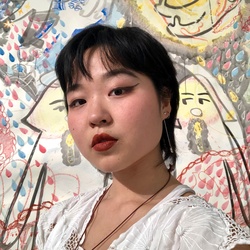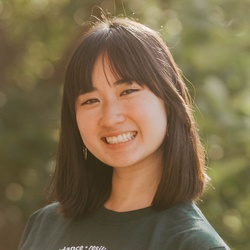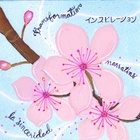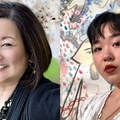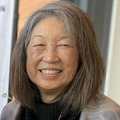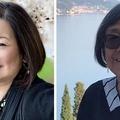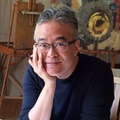Here we have a first for the Nikkei Uncovered poetry column - a collaborative piece between two wondrous young Nikkei, both University of California, Los Angeles (UCLA) students and “Shin-Nisei,” 1.5 generation artists. They write this from the place of anticipating their Pilgrimage together to Manzanar this month, alongside their cohort of the Vigilant Love Solidarity Arts Fellowship, which brings together college age Nikkei and Muslim activist/artists. Rino and Sophia, featured here, wrote together with such generosity that comes through in their piece of contemplation and insight. Enjoy.
—traci kato-kiriyama
* * * * *
Rino Kodama is a 3rd-year student majoring in Art and minoring in Asian American Studies at UCLA. They were born in Singapore to Japanese parents, and moved to Santa Clara, California at two years old. Home is here and there, moving with them where they feel seen and find safety in their queerness. Their interdisciplinary art practice revolves around drawing, photography, and wearable art through personal themes of healing and what it means to share safe spaces with loved ones and the world.
Sophia Inaba is a 4th-year student finishing up her studies in Musicology and Neuroscience at UCLA. She was born in Torrance, California to Japanese immigrant parents and spent her childhood there before moving to small town Cartersville, Georgia at the age of nine. She values these two homes for allowing her to explore her cultural values and navigate her Shin-Nisei identity. Her interests in the arts and integrative health have led her to pursue her dream of becoming a music therapist. She hopes to become an active member of the healing arts community to contribute to a movement for holistic health.
I Will Take in This Space
Rino
Sophia
Both
I wander with the label of “1.5 generation”, born in Singapore to Japanese parents,
Moving here at the age of 2. This is home after all.
I stand with blistered feet that have taken me to the Southern state of Georgia when I was 9. It looked different from my birthplace in Southern California, and no one there looked like me.
When I first learned about Manzanar, I believed I didn’t belong.
To this space, or history, or land
Our stories began in a different time and place
I have gone to Manzanar before as an outsider who supports, as a taiko player that performs for others,
With an attitude saying, “I’ll be there to create space for those affected, but not for me to take that space.”
I have never been to Manzanar,
a visitor piecing together stories told from friends, classes,
A history I used to believe I was foreign to
I will take in this space with gratitude.
Thankful for the labor into preserving this land,
Recognize this site belonged to Indigenous Peoples
before camps were built for Japanese Americans
We know people would forget if it didn’t exist,
Glossed over in high school history textbooks,
I didn’t really understand this part of history until college.
Just like “Shin-nisei”, a name we learned we have
After all the words we learned in weekly Japanese school,
This isn’t one of them,
There is a disconnect between our two history books, an us vs. them,
A can speak vs. can’t speak Japanese,
That only creates rifts between our stories when our roots grow across California, expand across the US, and over oceans reaching Japan
These roots must be so long
I will take this space
And put it on the palm of my hand
Only to realize it cannot be contained
In order to be fully seen and felt
I still see the wrinkles that tell me that this space has been contained for so long.
I didn’t feel it until I picked up some bachi, allowing them to follow the beats to Manzanar.
I will take this space with care
Looking through a lens for a land seen in Toyo Miyatake’s work,
Camera pieces smuggled in to remember, record life in camp
I remember seeing Mine Okubo’s drawings for the first time,
Realizing depictions of everyday life can be so needed,
Evidence
I will take this space and fill it with my history
Letting it unravel while it twists and entwines and loops into the histories of countless wanderers and seekers,
Yearning to pinpoint themselves in the collective of Japanese American narrative.
We all know this language,
this habit of Gaman,
It is second nature, but can we grow with it?
Not everyone may know the meaning, but we do it
The act of holding our tongue, remaining strong,
A quiet resilience we give our power to when things larger than us are in control.
The memory of Manzanar
It is held by those who lived in it,
Those who long and mourn,
Those who want to protect it and expand it at the same time.
I will take it and look at it in the eyes, my eyes
I am more than a color filling its designated spot
I am one of many holding the brush
This space has dimensions
Rooting from individuals
This space rests on the shoulders of all who come by.
Shin-nisei Japanese American, Yonsei, Muslim American, community builder
Human
Nothing more, nothing less
It’s a special plot that can’t be forgotten
We will take this space and let it consume us, so we can shout back to the world:
We’ve learned
There are hints
We can’t forget.
* This poem is copyrighted by Sophia Inaba and Rino Kodama (2019).
© 2019 Sophia Inaba; Rino Kodama




